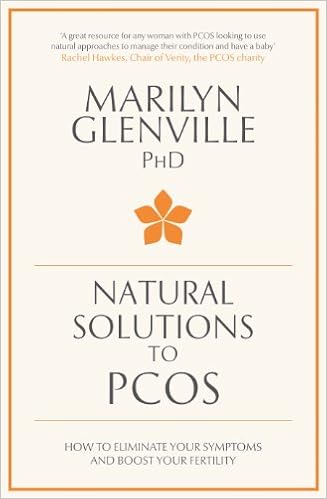Q: After years of being overweight, sprouting
excess facial and bodily hair, and having terrible skin, I have been diagnosed
with polycystic ovary syndrome (PCOS) by my GP. Is there a diet that can help?
 A: PCOS is the most common hormonal disorder in
women of reproductive age, affecting an estimated five to ten per cent. It gets
its name because the ovaries look as if they are covered in multiple cysts: in
fact, they are small undeveloped egg follicles.
A: PCOS is the most common hormonal disorder in
women of reproductive age, affecting an estimated five to ten per cent. It gets
its name because the ovaries look as if they are covered in multiple cysts: in
fact, they are small undeveloped egg follicles.
PCOS results in
distressing symptoms including acne, hirsutism and weight gain, and is a major cause of infertility. But it is
frequently misdiagnosed or even missed completely, according to Marilyn
Glenville, a registered nutritionist and chartered psychologist who has treated
PCOS for more than 30 years (marilynglenville.com).
There is a simple diet
to combat PCOS. In her book Natural Solutions to
PCOS (Macmillan, £10.99*), Glenville details a regime that ‘will dramatically
improve the quality of your life, and may even get rid of your PCOS’. It is
also a sensible diet for everyone.
The first principle is
not to go without food for more
than three waking hours, to keep your blood
sugar levels balanced. This is key in treating all hormonal imbalances.
With most PCOS
sufferers the body produces too much insulin, triggered by refined carbohydrates. This is the principal cause
of weight gain and the overproduction of male hormones, which underlie
hirsutism and acne.
Base your diet on
unrefined carbs including vegetables (not potatoes and parsnips) and fruit (berries, apples, pears and
citrus), plus barley, brown rice, buckwheat, maize, millet, oats, rye, spelt
and wholemeal bread and pasta.
Add protein to every
meal and snack, which slows down the
absorption of food and thus insulin production. Eat plenty of oily fish and
omega-3-rich foods including eggs and nuts, also vegetable protein such as
quinoa, hummus, nut butters such as almond and seeds. Cook with olive oil.
Avoid white flour and
white sugar in any form, fruit juice, honey,
chocolate, instant porridge oats, soft fizzy drinks, white rice.
Eliminate all dairy
products for 12 weeks. Milk is full of
hormones, principally acne-triggering androgens. Try organic coconut or organic
soya milk instead. Cut out alcohol to improve liver function. Reduce caffeine
to rest adrenal glands, and saturated fats to reduce inflammation.
Like many people, my
40-something friend Eva has sleep problems. She can get to sleep only to wake
an hour or so later. But a break at the luxurious Gleneagles Hotel in
Perthshire following the Espa Life Sleep More programme, one of several
individually tailored Lifestyle Programmes, seems to have broken the web of
insomnia.
The Espa Life
naturopathic practitioner Louise Westra prescribed a vitality-boosting regime
including acupuncture and nutritional therapy, as well as relaxing massages and
delicious-but-healthy meals. Eva returned enthusing about her ‘unique and
fabulous experience – I was impressed by the way the therapists
collaborated to address my problem’.
However, it’s very much
‘treat-level’ pricing. So here are some of the tips she learned: Waking after a
couple of hours may be a response to blood sugar dips (see right) so Eva now
eats an oatcake with peanut or almond butter just before bedtime. Early morning
exercise is better for sleep than stimulating late night work-outs, so Eva took
pre-breakfast power walks around the hotel’s beautiful golf course and now
walks at least part of the way to work. For those with problems dropping off,
Eva says the acupuncturist’s tip of pressing the point midway between your eyebrows
really helps. gleneagles.com, tel: 0800 389 3737
Don't get blindsided
Untreated, glaucoma is
one of the leading causes of blindness. I once interviewed a 60-year-old woman
photographer who nearly lost her sight – and her career – due to the condition.
I always urge everyone over 40 to have full eye health checks every two years.
If glaucoma runs in your family, get checked every year (some experts recommend
this from 35). Eye tests are free for over-60s, and those over 40 who have a
close relative with glaucoma or other risks. Visit glaucoma-association.com.
Reader recommendation:
‘During the menopause, my brittle fingernails went from bad to impossible – I
could peel them off. After using Nail Magic as directed for three months, my
nails are strong and long. I am thrilled!’ Nail Magic, £9.95, from Victoria
Health.
Corbis. always consult
your doctor if you have a medical problem. *To order a copy for £9.99 with free
p&p, contact the You Bookshop on 0843 382 1111, you-bookshop.co.uk
Read more: http://www.dailymail.co.uk/home/you/article-2151120/Health-notes.html#ixzz3pdr7rUTt
By Sarah Stacey for The Mail on Sunday
 A: PCOS is the most common hormonal disorder in
women of reproductive age, affecting an estimated five to ten per cent. It gets
its name because the ovaries look as if they are covered in multiple cysts: in
fact, they are small undeveloped egg follicles.
A: PCOS is the most common hormonal disorder in
women of reproductive age, affecting an estimated five to ten per cent. It gets
its name because the ovaries look as if they are covered in multiple cysts: in
fact, they are small undeveloped egg follicles.